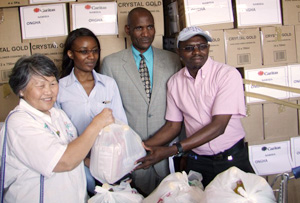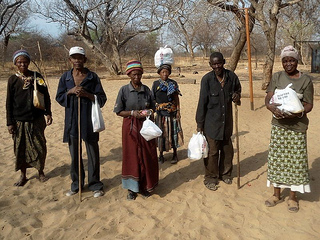
“The unequal distribution of wealth in Namibia is a problem. There’s wealth in the country but no spirit of solidarity among those who have it.”says Sr Aida Manlucu of Caritas Namibia (left). Credit: Caritas Namibia
At the risk of sounding like National Geographic, Namibia is the 34th largest country in the world and has the least rainfall in sub-saharan Africa.
Sr Aida Manlucu says that the sheer size of the country is just one of the challenges she faces as director of Caritas Namibia.
“There’s a lot of travelling in my job. I get on the road and I drive for hours without seeing anyone. I used to do up to 1000 kilometres alone across Namibia, now I take a companion with me,” she says.
Namibia is currently facing its worst drought in 30 years. Almost half of the 2.2 million population has been suffering from hunger. Sr Aida has been spending a lot of time on the road trying to organise the Caritas response.
To help people hit by the drought, Caritas Namibia launched its first ever emergency appeal last year. They needed donations of up to US$840,000 (EUR 626,000) to people caught up in the food crisis.
They distributed food including beans, oil and sugar, to supplement food given by the government in September and March. The first distribution helped 13,500 households and the second 15,500 households.
Leticia Aijambo, 69 years old, is a grandmother who lives in Anamulenge, a town located in the Archdiocese of Windhoek. She looks after her seven grandchildren, for in Namibia it is common practice for parents to leave the children with their parents in the village, while they go and look for work in the big cities.
At the height of the crisis, Caritas provided Leticia with an essential foods parcel, including beans, rice, oil and sugar. “Our crops were completely destroyed last summer, and we had nothing to harvest and store. The support provided by Caritas has made a real difference. If the rains continue this year, then we should have a reasonable harvest in June. But if it does not rain enough, the situation will be alarming, “she said.
Sr Aida is the only professional member of staff in Caritas Namibia, apart from the secretary general, so they rely heavily on volunteers.

In March 2004 Caritas Namibia distributed beans, sugar and cooking oil to 15,500 households suffering from hunger. Credit: Caritas
“The volunteers do the leg work,” says Sr Aida. “To distribute the food, each of the 47 parishes sent five volunteers to help. I organised them overall and a priest in each parish supervised them. We managed to cover 11 out of 14 regions.”
She says that people are responsive on a grassroots level when Caritas needs volunteers and she really encourages a spirit of solidarity. But she says that sustainability is difficult. “The unequal distribution of wealth in Namibia is a problem. There’s wealth in the country but no spirit of solidarity among those who have it.”
But, she says, she receives support from the Caritas confederation: “I feel very much the presence of other Caritas organisations. I go to Caritas Africa for help with resources, Caritas Internationalis has been good and Catholic Relief Services (CRS – a US member of the Caritas confederation) helped fund our emergency programme.”
Sr Aida feels that if Caritas Namibia could employ local staff they could really improve the way they work: “Self-reliance is important. I’d like to establish a serious structure with serious staff.”
Sr Aida is a Maryknoll sister. She trained in chemical engineering in the Philippines, where she was born, and worked for many years in Latin America. She’s worked in Namibia since 1997.
“I used to coordinate the gender desk,” she says, “then I was asked to take over Caritas Namibia in 2011. I loved working with women on issues regarding them and their rights, helping in skills training, income generation etc. My main thing is development. Most households in Namibia are headed by women because the men migrate or leave them.”
Sr Aida is very determined to promote solidarity in Namibia and help communities become self-reliant. She doesn’t know how long she’ll be able to stay there though.
“I’d like to stay but my community is dwindling so I don’t know,” she says, “I can still work hard and while I’ve got the energy, I’ll still push for change.”
